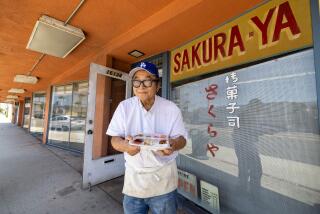Hana, Maui, festival to celebrate taro -- and poi
- Share via
Taro, a crop whose roots date back centuries in Hawaii, will be celebrated this month in the remote Maui village of Hana.
Taro is best known as the plant from which poi is made, but it can take various forms, many of which will be served and sold April 25 and 26 at the East Maui Taro Festival. Admission is free.
If poi is served fresh, it is sweet-tasting, Hawaiians say. The mash often is made by pummeling taro roots using a pounder made of rock.
Visitors can experience poi pounding and sample poi from 8 a.m. to 5 p.m. April 25 at the local ballpark. Hana, a rustic and remote village, is reached either by a breathtaking drive along the serpentine Hana Highway or by air.
Bags of freshly made poi will be among the items sold at a farmers market. Live music and hula will also be part of the celebration.
April 26 kicks off with a taro pancake breakfast from 7:30 to 10:30 a.m. at Hana Bay beach park. Tours of the verdant Kahanu Garden will start at 11 a.m. The botanical garden is home to Piilani Heiau, a giant lava-rock structure believed to be the largest ancient place of worship in Polynesia. Admission fees will be waived on April 26.
Guests can see how taro is grown in water-soaked basins during a visit to Kapahu Living Farm in nearby Kipahulu. Free tours start at 1 p.m.
Once a staple of Hawaiian households, poi is making a comeback, thanks to its health benefits. Taro roots can also be steamed and served as a vegetable. Meat dishes are sometimes cooked with the plant’s leaves, which, when baked, are said to taste like collard greens.
Follow us on Twitter at @latimestravel
More to Read
Sign up for The Wild
We’ll help you find the best places to hike, bike and run, as well as the perfect silent spots for meditation and yoga.
You may occasionally receive promotional content from the Los Angeles Times.






